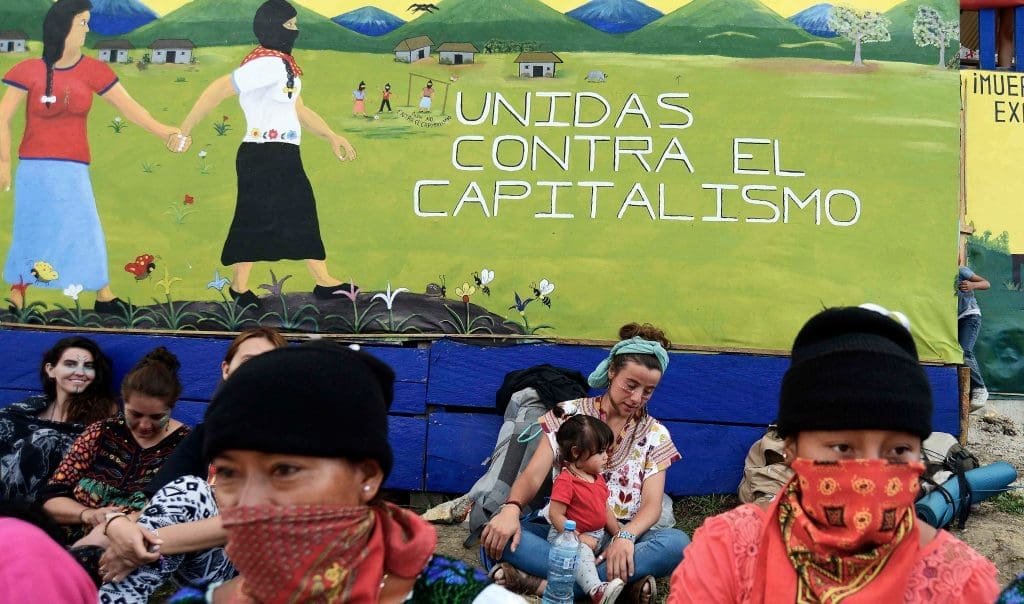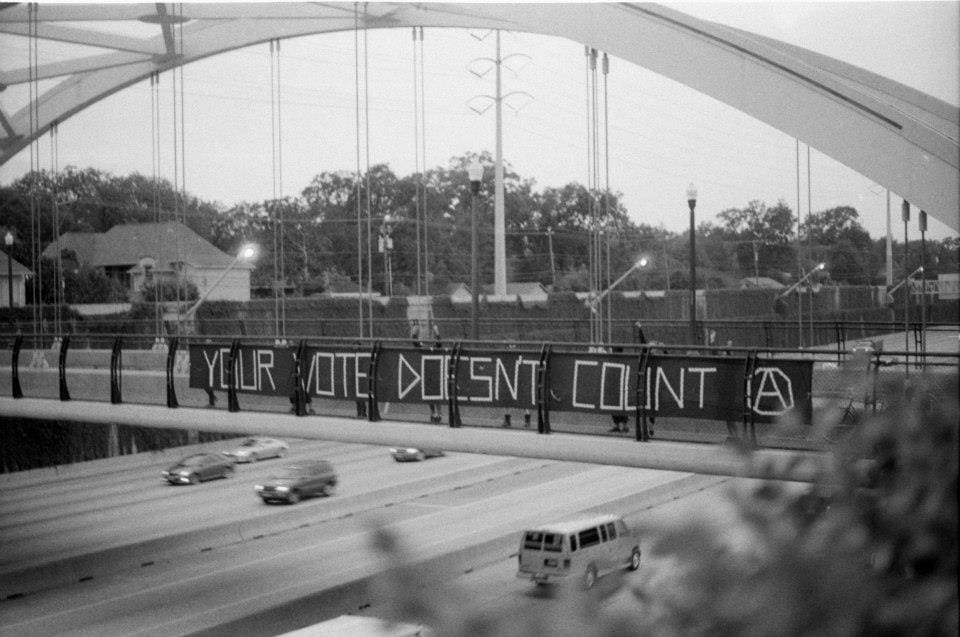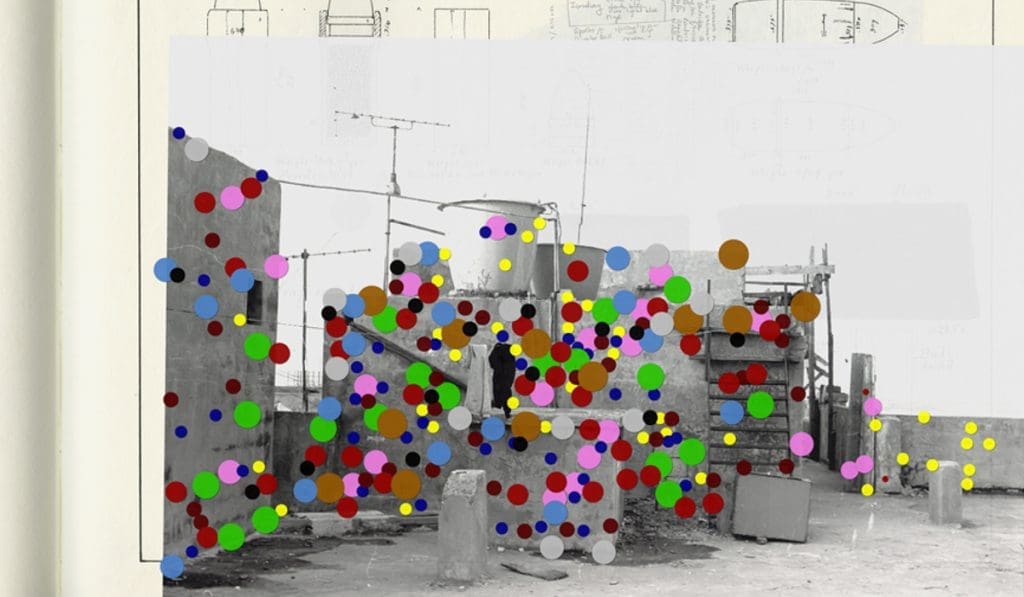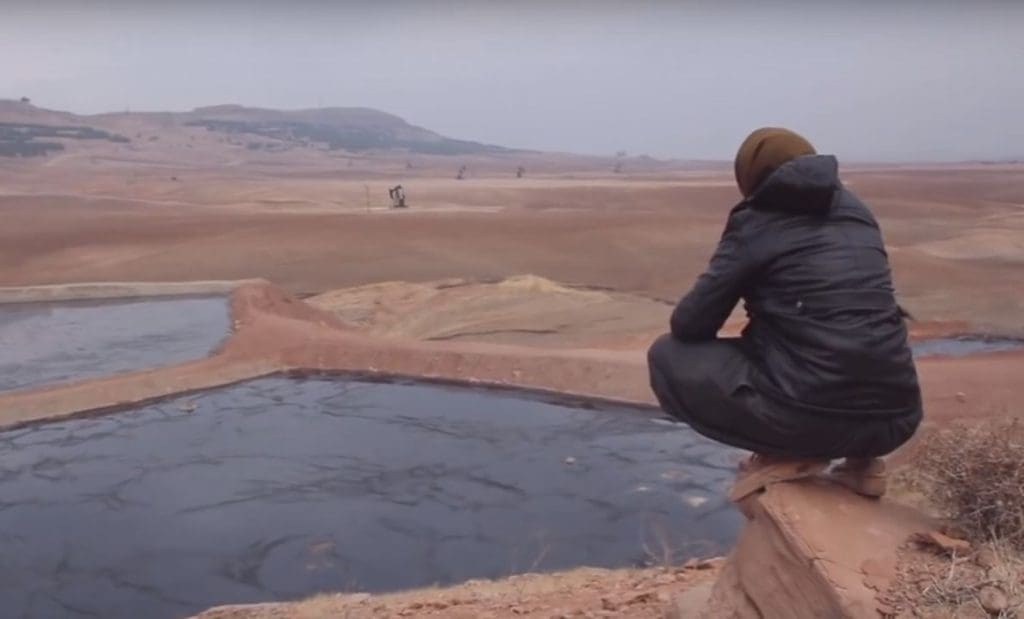AntiNote: This is a two-part post featuring an English translation of a brief interview with the Mud Wizard of Lützerath in a leftwing German publication, followed by the statement he read in municipal court on the first day of his trial last month.
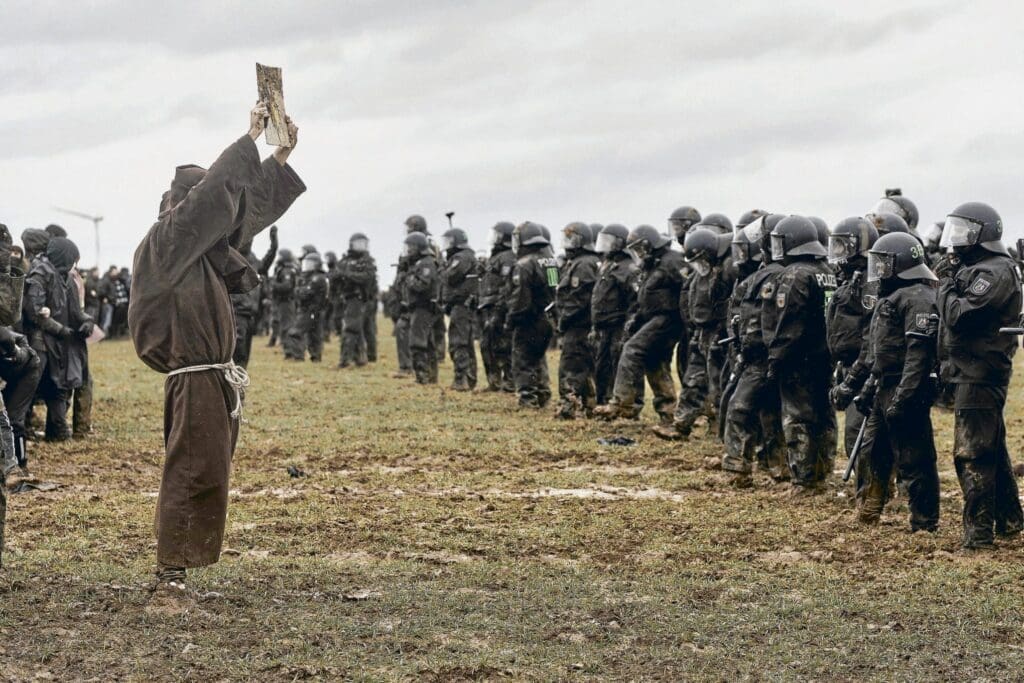
The Mud Wizard of Lützerath: “I thought, ‘Well, now I’m toast.’”
The trial of Loïc Schneider, better known as the Mud Wizard of Lützerath, began on 22 January 2025. He spoke with neues deutschland as it approached.
Interview by Anton Benz
19 January 2025 (original post in German)
Anton Benz: The eviction of the Lützerath protest was two years ago, almost to the day. How do you remember the fourteenth of January, 2023?
Loïc Schneider: I took part in the demonstration, grouping up occasionally with the Christian initiative “Kirche im Dorf Lassen” [“Leave the church in town”]. I was filming what was happening with my phone for a livestream—and I wanted to keep it at that, because I was already having legal problems at the time. But even as I was just filming, I broke down in tears several times because I was seeing so much violence. At some point it was just too much for me, I couldn’t bear it any longer. The police were wantonly attacking and beating peaceful people. Then when one more officer charged people, I instinctively stuck out my leg and brought him down. It was a reaction to what was going on. I wanted the violence to stop.
AB: What followed were scenes that got international attention: police officers are stuck in the mud; you, in a monk’s cowl, by contrast seem to be able to move without trouble. You stick a protest sign in the ground in front of one officer, he throws it away, you push him down. Twice. The video went viral.
LS: The sign in the video belonged to a person who had previously been beaten by police and hospitalized. I wanted to carry it in the demonstration on their behalf. I don’t regret my behavior; for me it was about protecting people, not committing violence on the police.
AB: Afterwards many wondered who it was under the cowl. You later revealed your identity in an interview with Stern. The prosecutor’s office in Mönchengladbach says this was the crucial factor in bringing charges against you. Why did you do that?
LS: I’d like to make one thing clear: it’s never been about media attention for me. Quite the opposite. After the eviction of Lützerath a year passed without me saying anything. In January 2024, an article appeared in Bild that named me and alleged I was the Mud Wizard of Lützerath.
I thought, “Well, now I’m toast.” Mostly I wanted a chance to respond to the article and set a few things straight. That’s why I approached Stern.
AB: Then what happened?
LS: The prosecutor’s office halted their investigation because they couldn’t definitively prove it was me who did it—and that was after the Stern interview had already come out. But they learned of it afterwards; that led to the charges I’m being tried on now.
AB: How has all this affected you?
LS: I’m really angry with Bild. It’s not right to have publicized my name when the investigation was inconclusive. I’m planning to sue. I regret having given that interview, but I can’t turn back time. I will plead guilty in court and use the attention to speak to more important things. Because for me it’s about fundamental moral principles, like how humanity is behaving right now: we are depriving future generations and civilizations of their right to exist. We have to defend against this.
Loïc Schneider is 29 years old and works in elder care and as a vegetable grower. After the eviction of Lützerath he became known as the Mud Wizard (or Monk) of Lützerath. He runs the @monchlutzi account on Mastodon and other social media.
Translated by Antidote
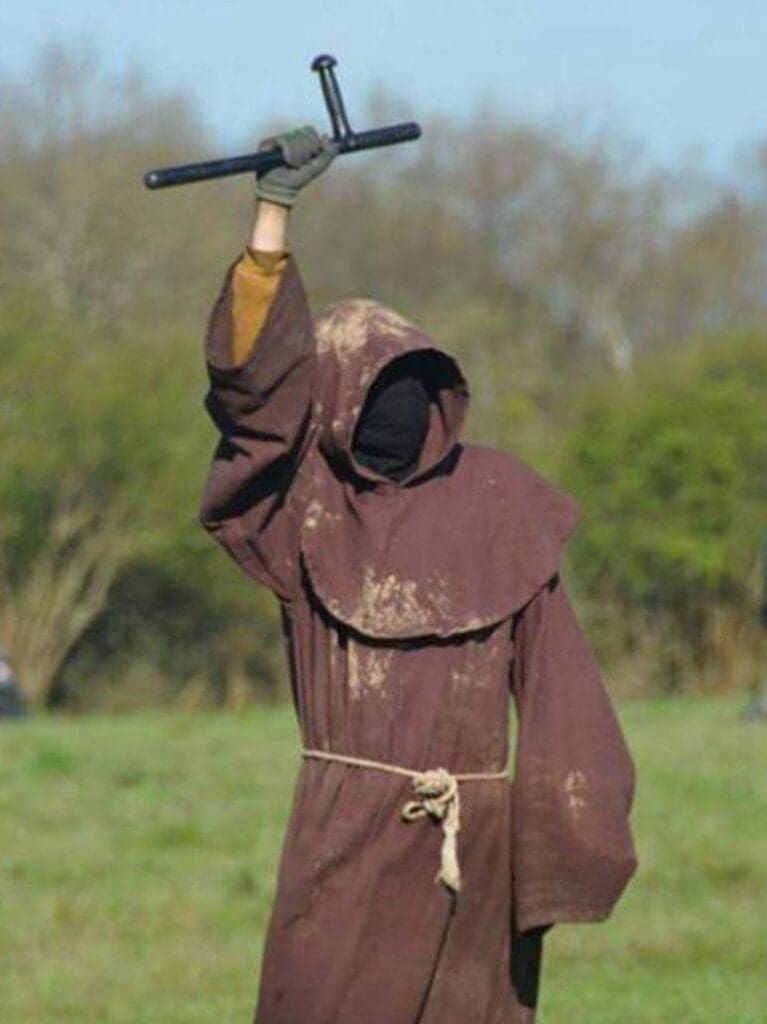
Court Statement by the Mud Wizard of Lützerath
read in Erkelenz municipal court by Loïc Schneider
22 January 2025 (original post in German)
posted on justpaste.it by the Mud Wizard
3 February 2025 (original post in English)
If all the police had been overpowered in the mud by a thousand monks, the rest of the demonstration could have gone all the way to Lützerath. We would have saved the village and its magnificent tree houses. A festive banquet would have lasted all night.
Your Honor,
Here I am before you to respond to the charge made against me of being the Monk of Lützerath. But how can I respond to a police and judicial institution that has initiated 270 complaints against people who came to demonstrate that day (600 since the beginning of the fight)—and none against police officers that actually led to convictions? Police officers who represent the law, but don’t have the courage to comply with the law and say, “I hit a skull with my baton.”
How can I respond, when who I am and what I do for a living will influence the decision? As if I was a banker or unemployed should have an impact on the verdict. Wealthy people, stars or politicians, often fare better than others. That is not justice. Things have hardly changed since three hundred years ago, when La Fontaine said: “Depending on whether you are powerful or miserable, court judgments will make you white or black…”
This case has had an impact on German society, with a historic mobilization of almost thirty thousand people, and the massive spread on social media of the video of the monk pushing a policeman through the mud. Nonetheless, there are only sixteen seats to attend the hearing, which will have to be shared by the media, my family and friends, as well as people offering me support and the curious.
One year after the Lützerath demonstration and the setting up of an EK Lützerath commission to investigate and find the demonstrators who threw mud, the identity of the monk was revealed by the press. He was said to be French. An article fueled by a police source came out in the conservative sensationalist tabloid Bild, which went so far as to share my first and last name. It was a scornfully-written article that ended with “Loïc S. could face up to five years in prison,” just to scare me.
When I read this Bild article after its publication on 10 January 2024 I knew for certain I was going to be the target of a lawsuit—otherwise no journalist would have dared publish so much personal information publicly in the press, especially my full name.
I decided not to wait for the court summons, and to show that I was not afraid of a trial. A friend suggested that I respond to these accusations via a German newspaper. I did an interview in Stern, which I did not know. At the same time, I contacted my lawyer in Germany, who was trying to find out more about the ongoing investigation into me. I began to regret having done this interview. Two weeks after the Stern article was published, my lawyer called to tell me they were dropping the charges against me for lack of evidence. I was delighted to hear this, but disgusted that I had conducted the interview, which could maybe become a new piece of evidence.
Unfortunately, this is what eventually happened. I wanted to explain this process to you, because I read in the German press that I had “denounced myself.” If I really wanted to say I was the monk, do you think I would have waited a year to do so? Why didn’t I do it right away, when the video was all over the news in Germany? I would have preferred this figure to remain mysterious and anonymous.
* * *
Coming here to make a statement is not easy. In order to have a debate, you need ideas—but when I received your invitation, made up of sections of law from the penal code, I was not very inspired.
The minister general of the Franciscan monastic order, Brother Markus, issued a press statement saying: “He has wronged,” in reference to the person he describes as a “false monk.” In an interview entitled “Würde ein echter Mönch Polizisten schubsen?” [“Would a real monk shove police officers?”] conducted with the Zeit newspaper, he was able to bring some substance to his thoughts—and thus to my answer.
First of all, I’d like to say how much I appreciate his frankness, and the testimony of his moral engagement which he has previously given against DeutscheBank, with a placard he held up on which was written: “Our economic system walks on corpses,” a very meaningful image that is still relevant today. It is an ultimate challenge to know how to make visible here the suffering accomplished by the cogs of the capitalist machine, often far from our sight, where the corpses lie.
At the start of a demonstration from the village of Keyenberg, near Lützerath, Juan Pablo came from Colombia to talk about a coal mine in his country, much larger than the Garzweiler open-pit mine, which is already the largest in Europe. In Colombia, Indigenous people’s struggle to preserve their villages and forests often ends in bloodshed, and they have lost many of their own. And, to add insult to injury, he declared that coal was being exported from there to Germany. “Our economic system runs on corpses.” African corpses, Indian corpses, South American corpses, Chinese corpses.
China is a country that we tend to criticize with our good Western conscience, while we benefit from a considerable number of consumer goods produced there. Our elites make economic alliances with globalized capitalism and all the oppression it brings. The comic strip and film Snowpiercer help to illustrate today’s mechanisms, and the different levels of consciousness and perception of suffering. The closer we get to the elites and to power, the more we live in an illusion. Let’s shatter our illusions and read Jack London’s The Iron Heel, so that we no longer wage war between peoples, but against the powerful of this world.
For Brother Markus, pushing a policeman into the mud is enough to stop being a monk. It is the ultimate sentence, the last judgment. In this case, the policeman was not even hurt, as reported by the press. In fact, the situation is unusual and rather amusing for a large number of people behind their screens. Just think of the millions of people around the world who were able to laugh and extend their life expectancy. Nothing cold, nothing tragic.
But the affront is there: it is the reversal of the relationship of domination. A person could be superior to the police for a moment, thanks to the mud. The police should be all-powerful and able to control everything. When Brother Markus says: “But in doing so, he takes advantage of their powerlessness,” isn’t this their case at every moment? Aren’t we constantly faced with police officers who take advantage of our powerlessness?
I don’t like it when people exploit our powerlessness either. I don’t like thousands of people being beaten by enraged police officers, shouting and brandishing their batons. Right from the start, the police charged blindly. I saw bloody faces and unconscious people on the ground. I cried three times because the violence was so unbearable. Activist networks in Lützerath reported that forty-five people suffered head injuries at the hands of the police during the demonstration. Forty-six with me, as I was hit in the face for no reason by a policeman while filming a scene of police violence. I’m lucky enough to have had just a few temporary scrapes.
As activists are not as organized as the police, we will never know the exact number of injured demonstrators, and many people went home traumatized. I tried the strategy of not moving when the police charged, holding each other by the arms. It was sacrificial in a way, quite effective in holding position, but useless in the hope that the police wouldn’t be violent, and therefore far too traumatic a sight: the seriously injured and the blood. I hate seeing blood. I myself received a hard blow to the elbow for no reason.
For half the time of the demonstration, I was filming live for a media outlet on the social networks of the Gilets Jaunes in France. I really didn’t want to be noticed; I stayed from time to time with a group of Christians from the “Kirche im Dorf Lassen” movement that I like.
I must have spent several months in Lützerath overall since 2020. Two Christian women behind the Lützerath Mahnwache [Vigil] dropped me off at the hospital in Erkelenz after I contracted Lyme disease from a tick in a strawberry field near Meuchefitz; it was during COVID, the right side of my body was getting more and more painful, and I thought I had the virus, so I isolated myself in a room. It was in the house lent to activists by the last farmer in Lützerath. Once at the hospital in Erkelenz, I was able to receive effective treatment.
Back to the demonstration. During one of the many incomprehensible police charges that happened that day against the demonstrators, I tried to prevent the unrestrained police violence while I was filming. I tripped an officer and he fell to the ground on his own momentum. I did not mean to do that at all. It was a spontaneous reaction, stronger than me. I didn’t want to cry a fourth time as I watched people getting beaten up. I felt it was a nonviolent action to stop this policeman from being violent. I felt I was being effective. Then I ran to avoid getting caught, and I kept asking myself, “What have I done? What have I done?” and I stopped the live feed and deleted the video.
Let’s recap: since the start of the demonstration, I’d been hit in the face, hit on the elbow, cried three times when I saw the blood and the police violence. This little sting was my first reaction.
Brother Markus would have preferred that I hug the policeman. But how could one do that after this experience of violence? How often do you hug someone who hits you senselessly in the face and elbow with a baton? It’s true that, given the situation in the mud, it would have been interesting to hug the policeman who was bogged down, but he would probably have rejected me in the same way he rejected, with a threatening gesture, the little sign I wanted to put up.
It’s easy to proclaim moral judgments about the importance of nonviolence, but how do you put them into practice and still have the possibility to win? If Brother Markus had actually participated in the demonstration, it would be easier for me to hear his words and advice. But I don’t feel like I’m talking to someone who today has the same fears as I do, and who sees the need to do something to prevent the capitalist system from destroying future generations.
Now that I’ve said that, I hope from the bottom of my heart that at the next big demonstration, anyone willing to will come and hug a policeman. We need all awake and sensitive forces!
The policeman got up from my tripping and joined his colleagues, who went on bludgeoning. He was just a little late in his exercise of violence and didn’t get to deliver as many blows as he would have liked. In itself, this is not tragic—on the contrary. If all the police had been overpowered in the mud by a thousand monks, the rest of the demonstration could have gone all the way to Lützerath. We would have saved the village and its magnificent tree houses. A festive banquet would have lasted all night. By driving out the destructive machines and the police, we could have rebuilt the wonderful utopia that was expressed in Lützerath.
* * *
That day, there was something far worse than pushing a policeman in the mud. There was unprecedented police violence. I saw policemen rushing in all directions with their batons and hitting people who were standing in solidarity with each other and not reacting. And later, the crowd responded by throwing mud and a few fireworks, which was ridiculous when you consider that the policemen were protected from head to toe by a plethora of protective gear.
And I’m really very curious to get a detailed description of the police officers’ injuries, because I’m afraid this is just a publicity stunt designed to legitimize unprecedented police violence. Either seventy injured police officers are a joke, or the German police really do have a problem with mud. On the one hand, you’re exaggerating the violence that the police are alleged to have suffered, while on the other, you’re indifferent to the violence that the people who came to demonstrate were subjected to.
If it had been a policeman without a helmet who had been hit on the head with a truncheon, with his skull bloodied so badly that he ended up in the hospital, I can assure you there would have been a lot more media attention. Everything would have been done to find the person and he would have been locked up immediately! But when it’s a policeman who does it to a demonstrator, there’s little or no reaction from your institutions.
Blows to the head are illegal—shouldn’t the police respect and enforce the law? Did we hear the police chief call them “pseudo-police,” like Markus called me a “pseudo-monk?” There are enough videos on the internet of police beating heads. Is criticism as harsh as you’ve been to me? All I did was push around in the mud. The only victim in this scene is the pride of a police force and a state that no longer know how to react. Besides, many police officers pushed people in the mud that day. So it’s not the act of pushing in the mud that’s problematic, but the clothes worn by the person doing it.
Brother Markus said that if he were a victim of police violence, he would “not use counter-violence but file a complaint,” while being willing to “let the media orchestrate the whole trial.” I don’t mind admitting that if he’d been in that demonstration blocking a police charge, and a policeman had hit him on the head with his baton, there might have been a trial. He might even have won. But Brother Markus wasn’t there. All there was, was violent police.
Several people were hospitalized for these injuries. Are there any plans to bring the violent police officers to trial? No, we’re actively looking for people whose crime is to have wanted to defend Lützerath, probably because of the muddy projectiles thrown at the “traumatized” German police. If the same police violence had taken place against Markus, perhaps there would have been a trial he could have won. Is this because he is the minister general of the Franciscan order? That is a form of unequal treatment: because of one’s title or function, one can enjoy privileges that others would not.
There were also no trials against violent police officers during the G20 protests in Hamburg, despite the fact that there were a huge number of serious injuries, complaints of police violence, and videos documenting the misdeeds. Olaf Scholz went so far as to lie, claiming that “there was no police violence at the G20.” Did he also lie about the “CumEx” tax fraud case and the forty-seven million euros that the city of Hamburg was unable to recover? If so, Olaf Scholz has done three times more financial damage to the city of Hamburg than the G20 protests.
Max Stirner said: In the hands of the individual, force is called crime; in the hands of the state, force is called law. What he means is that it’s absurd to call violence, which is a crime, right. I agree with him that violence is problematic in all cases. And every time it is expressed, it must be questioned. Freezing its use prevents us from thinking about legitimacy and justice. Where in Lützerath does the legitimate use of violence lie? In defense of the village and its experimentation with life? Or in destruction and the exploitation of coal, which condemns future generations a little more every day? The question of the legitimacy of the use of violence must be asked in every conflict situation.
* * *
Is it possible to act successfully while remaining peaceful? This requires an interest in the effectiveness of nonviolent action and the objective to be achieved.
Brother Markus said: “Like Mahatma Gandhi, all you have to do is stand your ground and endure. Or dare something surprising: hug police officers instead of pushing them.” If Brother Markus wants to hug a policeman and the policeman hits him, getting a trial and winning it, why not? All strategies must come together to avoid catastrophe. However, it’s important to ask the other person if they agree to a hug, otherwise it can also be a form of violence.
Gandhi! Everyone is Gandhi today: we quote him, we identify with him, we make him our own. But do we really know him? When it came to compromises in the face of colonization, Gandhi was highly problematic, but that’s another debate.
Gandhi’s nonviolence was extremely demanding. He asserted that it “cannot be taught to those who fear death and do not have the strength to resist.” It even went so far as to be suicidal: “History is full of examples of men who, by their courageous death, with compassion on their lips, have changed the hearts of their violent adversaries. Self-defense is the only honorable act left when you’re not ready to set yourself on fire.”
His nonviolence implied “the cold courage to die without killing…” But, he added, “He who does not have this courage must cultivate the art of killing.” At this point, I’d like to nuance Gandhi, because I don’t agree. I think, for example, that material sabotage is a good means of action. This is what Mandela did against apartheid with the ANC, going so far as to blow up the institutional buildings of racist oppression, while being careful not to hurt or kill anyone. That’s why he served twenty-seven years in prison.
Gandhi said that “If we cannot defend ourselves and our women, and the places we hold sacred, by the force of suffering—that is, nonviolence—we men must at least be able to defend them by fighting.” There’s some sexism in this quote, but let’s stay focused on his philosophy of nonviolence. He goes on to say: “I repeat, and will repeat again and again, he who cannot protect himself, or his loved ones, or their honor, by facing death nonviolently, can and must use violence against his oppressor. He who can do neither is a burden.”
If Gandhi’s nonviolence has one fundamental conviction, it’s that of effectiveness. Be prepared to sacrifice yourself to achieve your goal. Not just sit down and stand up when the police tell you to, or sit back and let the police carry you away. Gandhi’s nonviolence is sacrificial, asking us to be ready, if necessary, to go to the point of losing our own lives in order to achieve the goal. But if we are unable to do so, in order not to be “a burden,” Gandhi recommends that we “use violence against one’s oppressor.”
In struggle, violence and nonviolence are not opposites or mutually exclusive. Martin Luther King himself replied to those who asked him to distance himself from riots that “barricades are the voice of the unheard,” unlike protest movements that sometimes distance themselves from violent people. Whereas if we follow Gandhi’s recommendations, we should rather disassociate ourselves from the mass of people who are neither ready to be effective through nonviolence to achieve victory; nor ready to fight oppression through violence. For they are burdens.
It’s time to lay these burdens at the foot of the cross, Brother Markus. The door to activism is wide open, and there are even Christian movements in Lützerath that are already heavily involved, such as the ecumenical initiative “Die Kirche(n) im Dorf Lassen.”
By wearing this religious garb, I hope to bring spirituality to the fight. How can we topple the powerful from their thrones? That was the meaning of my gesture.
* * *
In 2014, I was at the demonstration where Rémi Fraisse was killed by a police grenade. It was a demonstration against a dam project for intensive irrigation, which was ruled illegal and abandoned. His death traumatized me, but it also strengthened my resolve to continue fighting to save natural areas from destruction by absurd projects. Through other demonstrations, I have continued to experience situations of tension between demonstrators and the forces of order.
In France, we’ve seen the abandonment of the Notre-Dame-des-Landes airport, and the courts declaring several megapools illegal, following massive and determined mobilizations. But for this to happen, we need to stick together.
We need to move towards a concrete goal. Global change can be the fruit of a multitude of local victories. The Kurds teach us that even in a context of war and intense instability, it is possible to move towards self-management and the libertarian municipalism described by Murray Bookchin. Everywhere, pockets of resistance can emerge. And there is no dogma, no moral rules that must freeze the spirit of creativity. We have to fight so that in a thousand years’ time, new forms of society can exist, without pretending to imagine them today. Let’s learn to take care of our present, so that we can still live on this planet in a thousand years and beyond.
So that instead of one civilization dominating the whole planet, we can have thousands of other civilizations or wilder lifestyles—right now. Let’s dismantle and stop the destructive capitalist machine wherever it exists. We have no right to degrade our planet, to compromise the right of other human, animal, and plant life to exist in the future. This system of exploitation and oppression must collapse before it completely destroys our planet, biodiversity, and life’s inherent beauty.
We need to rediscover the power that comes from the free association of our existences. This power was expressed during the demonstration in Lützerath, where there was collective audacity in trying to save this village. It was a historic moment. We were different people from different backgrounds, but we were united in our determination to stop the destruction of Lützerath. It was this will that was most precious.
There were 30,000 of us, and only 1,500 police. When the demonstration began to deviate directly towards the village of Lützerath, we were instinctively able to spread out the police force thanks to the rural configuration of the fields. The police quickly tried to traumatize the demonstrators by randomly charging them and beating their bodies. Later, spontaneous attempts were made by several hundred people to run through the police line. Sometimes they failed—more often than not because they took too long to set up.
The police sensed this, and gathered their forces at the precise spot where the audacity was to be expressed. But on two occasions, victorious breakthroughs allowed the whole demonstration to gain ground. The policemen, after hitting the first people to pass, would then leave their position and run in turn to join their colleagues at the rear. The demonstration as a whole was able to get within a few dozen meters of the police station.
Here, the police were much tighter, the police trucks were almost glued together, and there were no real further attempts—although the collective motivation and desire was there! After two successful passes through police lines, and the spectacle of police officers sinking into the mud, morale was high! If the tens of thousands of demonstrators had decided to go at the same time, we would have gotten through. They would have been overtaken simultaneously by the mass advancing from all sides. All it would have taken was a better coordination of our aspirations.
How do we go about it? Ideally, we’d like to have a means of self-organization from the ground up, one that could be used in any demonstration situation and that everyone would be familiar with. When discussing this idea with friends, it was the sign of the yellow cross—symbol of the Lützerath struggle—that stuck. It’s a simple sign that anyone could make by crossing both arms in front of themselves.
This sign would mean: “I am motivated to advance through the police line.” From the moment one person makes this gesture, everyone else around can decide whether or not to make it too. If too few people make the gesture, the idea isn’t tried. But if a massive cross of arms is raised, bodies will naturally move together.
The meaning of this gesture must be completely nonviolent, and this is an important condition if the maximum number of people present at the demonstration are to participate. I know that, particularly in Germany, debates about violence and nonviolence are agitating and divisive. If the desire to try this strategy is expressed, it must be given the opportunity to exist.
Before making the move, it’s best to space out the police, especially in rural areas where there’s plenty of room. The aim will be to try to open up gaps so that the demonstration can get through. Those most determined and able to take a beating will be at the front. With the rest of the people advancing en masse, the moment of contact will be very brief, and not as long as during conventional confrontations.
Rapidly, the power of the coordinated mass will gain the upper hand over the police, who will quickly find themselves cornered due to the simultaneity of the action. If any of the police are particularly violent, the most determined can try to hug them, as brother Markus suggested; a policeman who finds himself under three hugs simultaneously will find it hard to continue his violence. You have to be careful not to smother them. If someone takes the opportunity to try and hit a policeman, the demonstrators could also give him a hug to calm him down. But this is unlikely to happen, as it didn’t in Lützerath, where the procession twice passed through police lines. The demonstrators were more interested in running to reach the village.
* * *
Tolstoy, Ivan Illitch and Jacques Ellul are Christian anarchist writers who inspire me. Having had a Lutheran upbringing, I questioned it after learning about the violence of Luther’s words. Addressing the knights of the princes, he said of the poor peasants who rebelled against the taxes and oppression of the princes: “We must tear them to pieces, strangle them, slit their throats, in secret and even in public, like we slaughter rabid dogs! That’s why, dear gentlemen: slit their throats, kill them, strangle them, free them here, save them there! If you fall in battle, you’ll never have a holier death.”
In the face of such Lutheran violence, which allied itself with and supported the powerful, I can only regret that the peasant revolts and Thomas Müntzer were ultimately crushed. The memory of the vanquished is often distorted by that of the victors. Are these poor rebellious peasants monsters and Luther a saint?
The real fanatics are the powerful of this world who make people kill each other in wars, the arms dealers who must be driven out of the sacred temple of our lives when part of our tax money finances death. Let the leaders of every state set an example and fight each other first, before sending their peoples to be slaughtered! According to the annual report of the Stockholm International Peace Research Institute (SIPRI), between 2019 and 2023 the biggest arms traffickers are the United States, France, Russia, China, and Germany.
We must put an end to all wars and to the destruction of life on earth. Every day the horizon darkens a little more. People look at each other with increasing distrust, when they should be uniting against the powerful. Prospects for world peace crumble as weapons take lives and sow death, driving even more hatred into traumatized hearts. We need victories over the full range of challenges facing humanity.
Three years ago, the war in Ukraine took a more tragic turn. In only two weeks, local residents and I organized a convoy from the town of Commercy to deliver around thirty ambulances to the Ukrainian border. I was responsible for coordinating with all sixty volunteers. We managed to pull it off, and I later founded an organization with them called “Against War Convoy” to continue running convoys.
These became smaller and smaller as the war dragged on. Our goal was to bring supplies to treat the wounded. I was driven by a deeply rooted dream: I pictured the front line overwhelmed by hundreds of thousands of ambulances from across Europe, with others coming to support the Russian people as well. I envisioned there being a thousand times more ambulances than tanks, so that the tank drivers would have no choice but to drive over them to get through. Then, with hearts heavy, they would end up crying and making peace. Utopian, I know.
In the age of the internet, with people communicating with each other thanks to this tool, I thought it would be a great idea to organize a big peace march between the peoples of Europe and Russia, where we’d all meet up at some point on the Russian-Ukrainian border to mingle and have a big peace party.
We need radicalism and creativity. Starting today, let’s multiply actions and initiatives everywhere. As the film Lord of War showed us, weapons can be found all around us. The business of death has no ethics and has managed to embed itself in our world through the false myth of national defense. What are our weapons doing in the Democratic Republic of the Congo, in the hands of hundreds of armed groups? They are fueling a genocide that has claimed nearly ten million lives, a tragedy that is hardly spoken of, while the unprecedented exploitation of the minerals in our electronic devices continues. What are our weapons doing in Saudi Arabia, where they are plunging Yemen into chaos?
This must stop. Around the world, we need a race towards disarmament. A great contest for peace. Points would be awarded for every arms worker who deserts, for every blockade or sabotage of arms factories. These acts of sabotage would be carried out in the same spirit as those of the ANC, in which Mandela took part—without causing injury or casualties. A global ranking system—updated with information from actions carried out in each country—would encourage everyone to strive for the top of the list, the one where the most radical desire for peace is expressed. Naturally, the biggest arms-dealing countries would start off with a disadvantage.
Maybe these ideas, a gesture to be made during a demonstration and a global competition for peace, won’t resonate. Perhaps not yet. But I was able to tell you what I had to say. I have got that off my chest. From my heart.
The Monk of Lützerath (Mud Wizard)
Edited lightly by Antidote.
Though initially threatened with five years (and the prosecution arguing for eight months), on 5 February 2025 Loïc Schneider was sentenced to 140 days’ imprisonment as well as fines and court fees (amounts undisclosed as of publication).
Support the Mud Wizard (and those injured by police in Lützerath) with a solidarity donation here.


